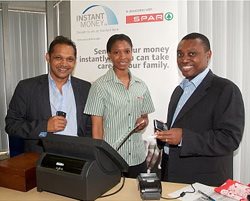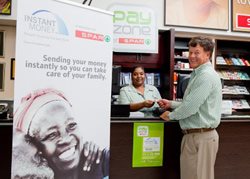Top stories




Marketing & MediaHow Spar is using localised marketing to redefine the urban retail experience
Karabo Ledwaba 1 day


More news





ESG & Sustainability
How South Africa’s conservation efforts can thrive with Indian partnership










Initially only available in the Eastern Cape stores, it has been developed in such a way that the service can be accessed on even the simplest mobile phone models and across networks.
Chair of the Spar Guild, Roelf Venter says that mobile money transfers not only offer a safer, more reliable way to send cash, but could also breathe new life into the economies of remote areas. “Like many developing countries, South Africa has countless breadwinners who live and work in urban economic hubs, but have extended families back home in poorer rural areas. We see a high demand for smart banking services that will make sending money back home simple and cheap,” he says.

Chief executive of Standard Bank, Sim Tshabalala, who is heading up the rollout, says the new service means people no longer have to risk giving an envelope full of cash to an intermediary - like a friend or a taxi driver - and asking them to deliver it to a recipient in a remote area. “It's a way for people who don't have a bank account to gain access to financial services. At present, financial services are not always available in rural areas, mainly because of the expense of rolling out banks and services in less affluent places. This has meant that most people in rural areas operate on a cash basis. It is estimated that some 35 million people in South Africa have a cellphone, while only 11 million have a bank account.”
Leading market research organisation, Gartner predicts that money transfers and payment systems using mobile phones will be among the top 10 most important mobile applications by 2012 - ahead of location-based services, search and browsing. Money transfers are already popular in a number of developing countries, and will continue to attract more users.